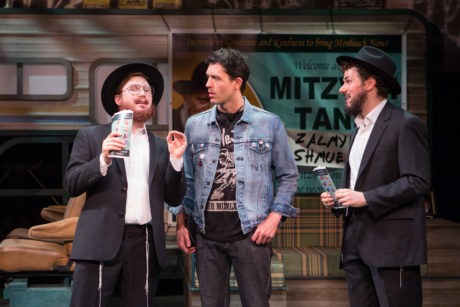I looked forward to taking in the premiere stage production of Lindsay Joelle’s Trayf at Theater J.

The title Trayf alone brought me smiles then and now. After all, trayf is the Yiddish word for food not in accordance with Jewish dietary law, though in my own Jewish upbringing, and to those folks I hang out with now, the word has come to mean a whole lot more.
Reading the Theater J Trayf program closely, I noted that the script had undergone a rethinking and reshaping since I first encountered it. That is certainly not unusual for new scripts as a production moves from page to stage.
I wondered why the change. In her program notes Joelle indicated that she re-framed Trayf with the support of Theater J Artistic Director Adam Immerwahr “to craft the story with a more delicate hand.” Hmm. I wondered what that might mean? Is delicate another word for “safer?”
Immediately, I became sharpened to the possible changes. I recalled that one of the script’s major dramatic, tension-making points-of-reference included significant connections to real events in New York City. The original Trayf contained fictionalized scenes related to the carnage that took place in New York City’s Crown Heights neighborhood in 1991. (For those less familiar with those days of carnage, information is readily available with an Internet search).
The Trayf play on the Theater J stage explores the world of two particular, long-time, best-buddy Chabad-Lubavitchers. What might happen as best buddies grow up? What might happen when the secular world can be a siren call?
The two buddies are Zalmy (Tyler Herman) and Shmuel (Josh Adams). Shmuel is the driver of a “Mitzvah Tank.” A mitzvah tank is a vehicle used by Chabad members involved in outreach as a portable “educational and outreach center” and “mini-synagogue.”

Zalmy is the navigator as they journey through Brooklyn neighborhoods asking strangers on the street (men only) if they are Jewish and want to do a “Mitzvah” (a good deed for religious duty). Zalmy is more worldly and open to the forbidden (trayf) secular world. Shmuel is more a devout follower of his Rebbe’s guidance.
As playwright Joelle says in her program notes, the play has been recast from its earlier script. “I think the strength of this play is the deep bond of friendship between the two men, which makes them instantly recognizable, even though they’re members of an insular religious community. Now, more than ever, we need plays that attest to our shared humanity that affirm that one can be deeply religious and committed to rebuilding the world instead of destroying it.”
As directed by Derek Goldman, in the Theater J production Zalmy and Shmuel are adorable, according to some in the audience I overheard. In the initial comic scenes, they are Abbott and Costello, Key and Peale funny. And that is a joy to behold.
Yet, while adorable may be a fine description of how they looked and acted in the production’s beginning scenes, over time they were far from adorable, let alone harmless, to the two other main characters who appear in Trayf.
One of the other characters is Jonathan (Drew Kopas), who has discovered his own hidden Jewish roots when he finds his Holocaust survivor and recently deceased father’s birth certificate. Jonathan believes he has a Jewish soul and wants to explore more of it. Over time he is even willing to undergo ritual circumcision to become a full member of the Jewish faith. While Zalmy is open to the idea of Jonathan’s journey into Judaism, Shmuel is less so. Very much less so.
Then, in one key scene, Leah appears (Madeline Joey Rose). She is Jonathan’s Jewish girlfriend, who opens her own heart and pleads her case about what Jonathan’s exploration into becoming a Jew by choice is doing to her and their relationship.
Things end badly for Jonathan and Leah. Jonathan is discarded like a bag of garbage. A man wanting to enter the faith is considered unworthy. Leah is not heard or her feelings understood. Shmuel and Zalmy may be best buds, but to others they are harmful and hurtful as ultimate rigid defenders of the faith. Love is an ache, indeed. And loving kindness for others seems nowhere to be found as the final sentimental scene plays out on the Theater J stage.
And, with the external world of the Crown Heights riots gone from the script, the only mention of tensions are between rival Jewish groups, but only in passing. By discarding the original references to Crown Heights, the play has become insular, at least to me. Delicate maybe, but safe and insular in what it presents.
For me, the now delicate Trayf is “overflowing with humor and heart” in its earlier scenes. But as it darkens it loses its humanity. Has the play become one for a particular audience rather than a broader public? There is little tikkun olam (a Jewish concept defined by acts of kindness performed to perfect or repair the world) in the final fade, with the choices made.
Running Time: 90 minutes, with no intermission
Trayf plays through June 24, 2018, at Theater J’s Aaron and Cecile Goldman Theater, located inside the Edlavitch DC Jewish Community Center, 1529 16th Street, NW, in Washington DC. For tickets, call the box office at 202-777-3210, or purchase them online.




